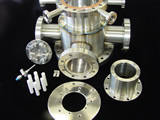CMP Research Centers & Facilities
Center of Research Excellence in Complex Materials
![]()
MSU CORE-CM, the Center of Research Excellence in Complex Materials, was inaugurated in July 2009 through funding from MSU's Office of the Vice President for Research. It ties together groups researching the physical properties of materials being developed for use in the technologies of tomorrow — advanced batteries and energy conversion devices, solar cells, engineered nanomaterials, bioelectronics and others.
Composite Materials and Structures Center
![]()
The Composite Materials and Structures Center is a multidisciplinary research facility located at Michigan State University's College of Engineering.
It is one of the foremost facilities for the study of polymer composites and is internationally recognized for its contributions to composite science and engineering. The faculty of the College of Engineering along with the full time staff researchers of the CMSC have expertise in processing, design and optimization, materials science, nanocomposite technology, structural analysis, surface science, failure analysis, and more. The CMSC offers the opportunity to conduct proprietary, confidential programs by assembling a focused team of researchers to address specific issues of importance to the client.
The Center is fully equipped with 8 laboratories totaling nearly 20000 square feet having the latest instrumentation for the study of composite manufacturing, performance, and durability.
High Performance Computing Center

The HPCC was established in 2005 to facilitate discovery by students, faculty, and staff at MSU through the use of high performance computing. The HPCC mission is to provide high quality, high performance computing services to the research community at MSU.
The HPCC began as a faculty-led initiative by several faculty members from the Colleges of Engineering (Profs. Kempel and Jaberi) and Natural Science (Profs. Piecuch, Bao, and Mahanti) interested in high performance computing. A pre-proposal was submitted to the VPRGS as part of the most recent Research Excellence Fund (REF) solicitation. In preparation of a full proposal to the REF program, a workshop was organized at the NSCL to solicit input from faculty across campus regarding their interests and requirements for an HPC center. This information, along with valuable insights from our Big Ten sister institutions, resulted in the plan for the HPCC.
Keck Microfabrication facility

Founded in 1994 as one of the first NSF Materials Research Science and Engineering Centers, the Center for Sensor Materials embodies interdisciplinary materials research with emphasis on sensing applications. The CSM shares its four major facilities with campus users and with a national network of 24 MRSEC's, extending its research capabilities throughout academia and the industrial sector.
Under the aegis of the National Science Foundation, the CSM Microfabrication Facility was opened to users in 1996. The 1200 square foot facility consists of a Class 1000 cleanroom for photolithography; a room dedicated to electron beam lithography, and an area for sample preparation, metalization, and processing. The Microfabrication Facility exists as a unique research and training environment on the Michigan State University campus, bring together students, faculty, and industrial scientists. In 1998, the facility was named the W. M. Keck Microfabrication Facility in recognition of the support of the W. M. Keck Foundation. The facility was located on the basement level, Room 36, Physics and Astronomy Building, Michigan State University, East Lansing.
Recognizing its importance, Michigan State University has constructed a new home for the facility. In October 2002, the facility moved to its current location (B142, BPS Building) inside the new Bio-Physical Science Building on MSU campus. The new facility have more than three times the space of the old facility. It features a Class 100 cleanroom for photoresist preparation and photolithography, three bays for scanning electron microscopy and electron beam lithography, and a vastly increased space for installing the needed vacuum systems for thin film preparations and characterization. The new facility is also located at the center of academic buildings on MSU campus, therefore is more easily accessible.
Center for Advanced Microscopy
![]()
The Center for Advanced Microscopy is the central microscopy laboratory for the Michigan State University Campus. We provide MSU researchers with formal graduate level instruction and 24/7 access to scanning electron microscopes, transmission electron microscopes, and confocal laser scanning microscopes. We support all research disciplines including nanotechnology.
P-A Machine Shop

The Department of Physics and Astronomy Machine Shop fabricates custom teaching and research equipment for the students, faculty and staff of our department, and more than 50 other departments located on the campus of MSU.
We utilize state of the art, computer controlled machine-tools to build high tolerance components and devices. Our staff has over 75 years of combined experience building one-of-a-kind instruments, often using modern CAD-CAM software to design and build our finished products. A complete Student Machine Shop is maintained nearby for use by those who would like to build their own projects. A shop class (free of charge) is offered for Graduate Students needing instruction.
SQUID Magnetic Susceptometer Facility

The Physics/Astronomy Department has two SQUID susceptometers from Quantum Design, Inc. for fast, precise measurements of the DC and AC magnetic properties of materials over a wide range of temperature and applied fields. Variations in magnetic moment as small as 10-8 emu can be resolved. The AC SQUID provide both real (in-phase) and imaginary (out-of-phase) components of the magnetic susceptibility to determine the energy dissipation in the sample as well as an environmental magnetic shield for very low residual field measurements.